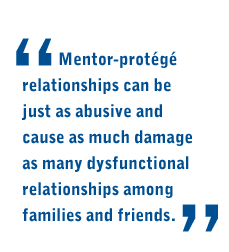


Mentoring Relationships: All Too Human
by Catherine Gianaro

Mentor-protégé relationships are often bittersweet experiences for both parties.

Mentoring programs in business have been widely hailed as the key to career success, and companies are spending billions of dollars implementing them. We imagine a Platonic ideal — a communicative and harmonious relationship in which the wise and virtuous mentor selflessly guides the ever-responsive protégé through the organization’s, and the field’s, rocky shoals. But are these pairings all that they’re cracked up to be?
“So many other personal relationships go sour,” said Lillian Eby, a psychology professor at the University of Georgia. “There’s certainly reason to think that mentoring too might not always be such a great thing.”
Finding the literature on negative interpersonal aspects of mentor-protégé relationships to be virtually nonexistent, Eby decided to examine the problems that people in either role can experience. She and a team of colleagues at UGA and other institutions studied both formal and informal mentoring programs, and they found that mentor-protégé relationships can be just as abusive and cause as much damage as many dysfunctional relationships among families and friends.
“The really bad stuff is not that common, but it does happen,” she said. “More usual are the nonmalicious incidences, like being neglected by your mentor or working with a mentor who lacks interpersonal skills or the expertise you need.”
Eby’s team found that many of the negative incidences among mentors and protégés are similar to other on-the-job interpersonal problems — such as abusive supervisors or interpersonal hostility. Protégés reported manipulative or overbearing mentors who neglected them or who lacked the necessary skills and abilities. For mentors, common problems included protégés who were self-centered, unresponsive or unwilling to learn.
Overall, Eby said, 70 percent of protégés and 54 percent of mentors reported at least one negative mentoring experience.
In a study from the mentor’s perspective, data were collected from mentors and thematically categorized into three types of experiences: dysfunctional relationships, ineffective relationships and marginally effective relationships. Subjects’ characterizations of their partners ranged from submissive (“It was difficult for me to get him to think on his own”) to egocentric (“This person was the most self-centered individual I have ever encountered”) and from exploitative (“The person ‘used’ the relationship for personal gain at the expense of other employees”) to harassing (“He referred to his [genitals] and then bragged about it to his co-workers”).
But how does a mentor-protégé relationship correlate with job attitudes, health complaints or intentions to leave a company? Will stressful relationships more likely result in other negative outcomes — such as depression, dissatisfaction and turnover intentions — for employees?
Eby found that, more often than not, mentor and protégé hang in there. “People stay in bad relationships for all sorts of reasons,” she said. “It’s usually because they get something out of it. They’ll take the bad with the good.”
This comes as no surprise to Eby, who was once a “powerless” protégé herself in a highly visible situation. She chose to stick it out, taking the view that there are ups and downs, just like in a marriage or a friendship.
“One mentor did wonders for me — gave me visibility and challenging assignments — but she was also belittling and manipulative, and involved me in her own political shenanigans,” Eby said. The researchers found that while extremely negative incidences are equally likely to occur within formal or informal mentorships, some non-malicious negative experiences, such as mismatches in personality and work styles, are more common in formal relationships.
“We would expect more problems with formal relationships because they can be like forced marriages,” Eby said. “People are often paired without using any systematic criteria. In the informal relationship, on the other hand, you’re attracted to someone interpersonally — it’s like dating. There’s some kind of appeal, so it’s likely that you’re more committed.”
Eby has published four studies that specifically examine negative aspects of the mentor-protégé relationship. The abuse, lies and deceit she found each time felt “like reading a steamy novel,” she said. “Well, maybe not quite that good.” Still, readers may bring great expectations to the book she is now writing on the subject.
For more information, contact Lillian Eby at leby@uga.edu or access http://www.uga.edu/psychology/faculty/leby.html.
For comments or for information please e-mail: rcomm@uga.edu
To contact the webmaster please email: ovprweb@uga.edu
![]()